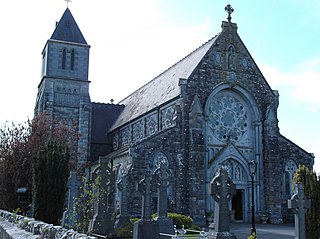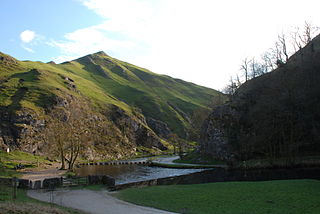The County Palatine of Tipperary Act 1715 is an Act of the Parliament of Ireland. This Act enabled the purchase by the crown of the Palatine Rights in County Tipperary given to the Earls of Ormond, later Dukes of Ormonde, over the preceding centuries. Prior to the Act, the dukes appointed the sheriffs and judges of the county and owned certain revenues from the county which would otherwise have gone to the Crown.
Sir James Donnellan was an Irish lawyer and politician, who became Chief Justice of the Irish Common Pleas in 1660. He was unusual among the Irish judges of the time in being of Gaelic descent; and more remarkable in that his service as a judge under Oliver Cromwell did not disqualify him from service after the Restoration of Charles II.
Sir William Methold was an English-born judge in seventeenth-century Ireland, who held office as Chief Baron of the Irish Exchequer.
Sir Humphrey Winch (1555–1625) was an English-born politician and judge. He had a distinguished career in both Ireland and England, but his reputation was seriously damaged by the Leicester witch trials of 1616, which resulted in the hanging of several innocent women.

Thomas Cantock, Quantock or Cantok was an English-born cleric and judge in medieval Ireland, who held the offices of Bishop of Emly and Lord Chancellor of Ireland.

John Bathe was an Irish barrister and judge. He was a member of a famous legal dynasty, and had a distinguished career under the Tudors, holding office as Solicitor General for Ireland and Chief Justice of the Irish Common Pleas.
Patrick Barnewall was a leading figure in the Irish Government of the 1530s and 1540s. He owed his position largely to his close links with Thomas Cromwell. He sat in the Irish House of Commons as MP for County Dublin, and held the offices of Solicitor General for Ireland and Master of the Rolls in Ireland. Today he is mainly remembered for his role in founding the King's Inns. He belonged to a junior branch of the family of Lord Trimlestown: his own descendants held the title Viscount Barnewall of Kingsland.
Sir James Dowdall was an Irish judge of the Elizabethan era who briefly held office as Lord Chief Justice of Ireland. He should not be confused with James Dowdall, the Catholic martyr, who was his cousin.
Robert Sutton was an Irish judge and Crown official. During a career which lasted almost 60 years he served the English Crown in a variety of offices, notably as Deputy to the Lord Chancellor of Ireland, Chief Baron of the Irish Exchequer, Master of the Rolls in Ireland, and Deputy Treasurer of Ireland. A warrant dated 1423 praised him for his "long and laudable" service to the Crown.
Robert Preston, 1st Baron Gormanston was an Anglo-Irish nobleman, statesman and judge of the fourteenth century. He held several senior judicial offices including, for a brief period, that of Lord Chancellor of Ireland. He was the founder of the leading Anglo-Irish Preston family whose titles included Viscount Gormanston and Viscount Tara.

Thomas Dowdall, also spelt Dowdale, Douedall, or Dowedall, was an Irish barrister and judge who held the office of Master of the Rolls in Ireland.
Thomas Stockton (1609–1674) was an English-born judge who held office in seventeenth-century Ireland.
Edward Somerton, or Somertoune was an Irish barrister and judge who held the offices of Serjeant-at-law (Ireland) and judge of the Court of King's Bench (Ireland) and the Court of Common Pleas (Ireland). He was born in Ireland, possibly in Waterford, although he lived much of his life in Dublin. By 1426 he was a clerk in the Court of Chancery (Ireland), and was paid 26 shillings for his labours in preparing writs and enrolment of indentures,. In 1427 he is recorded in London studying law at Lincoln's Inn. He returned to Ireland and was again in the Crown service by 1435, when he was ordered to convey lands at Beaulieu, County Louth to Robert Chambre, one of the Barons of the Court of Exchequer (Ireland). He was appointed King's Serjeant for life in 1437; he also acted as counsel for the city of Waterford, a position subsequently held by another future judge, John Gough.

Sir William Bathe was an Irish judge and landowner. He is commemorated by the Dowdall Cross in Duleek, County Meath, which was erected by his widow Janet Dowdall in 1601. He should not be confused with his much younger cousin William Bathe of Drumcondra Castle, who was a Jesuit and noted musicologist.
Sir John Lyndon was an Irish judge and politician of the seventeenth century. He was the first holder of the office of Third Serjeant-at-law, which was created especially for him, apparently as a "consolation prize" for not being made a High Court judge the first time he sought that office.

Sir John Bere, whose surname was also spelt Beere or Bare, was an Irish politician, Crown official, barrister and part-time judge of the early seventeenth century. He held office as King's Serjeant, and sat in the Irish House of Commons in the Parliament of 1613–15.
Sir William le Deveneys was a Crown administrator and judge in late thirteenth and early fourteenth century Ireland, who served very briefly as Chief Justice of the Irish Common Pleas.
Sir Samuel Mayart (1587–c.1646) was an English-born judge in seventeenth-century Ireland, who also had some reputation as a political theorist.
Sir John Elliott (1546-1617) was an Irish judge of the late sixteenth and early seventeenth centuries, who held office as third Baron of the Court of Exchequer (Ireland). He was also occasionally employed on diplomatic missions. Though his highly successful career was due largely to his own merits, it probably also owed something to his useful family connections, notably with the Rochfort family and the Usshers.

Sir William Sparke was an English-born judge in Ireland, whose memorial can still be seen in St. Audoen's Church, Dublin.






